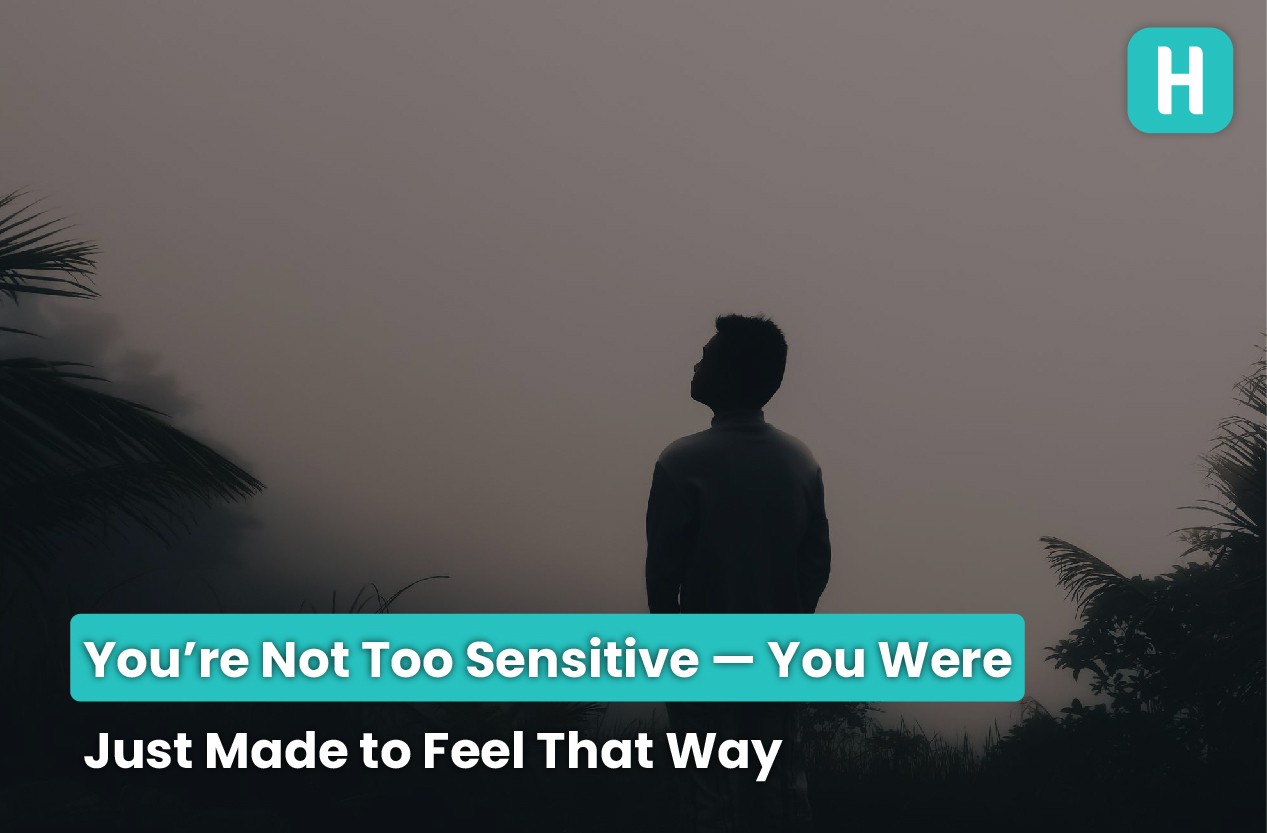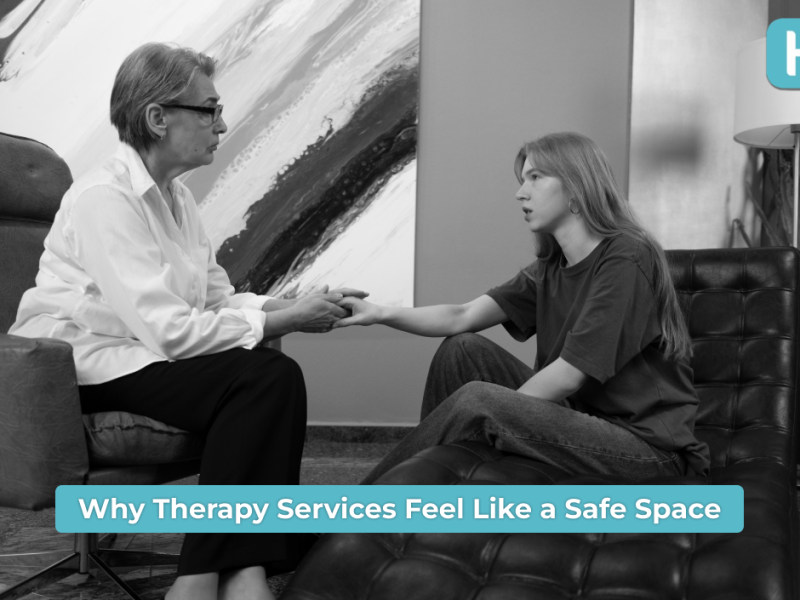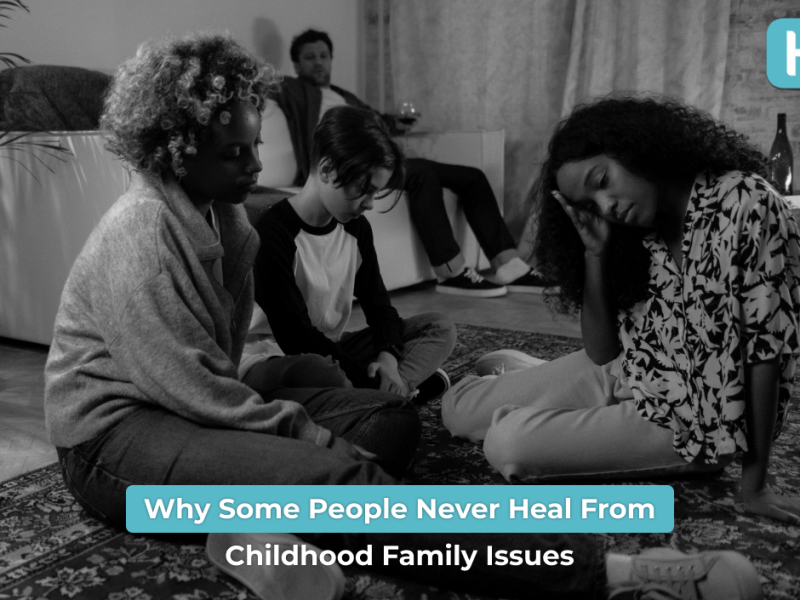“Don’t take it so personally.”
“Why are you always overreacting?”
“God, you’re so sensitive.”
If these lines echo in your head more often than you’d like to admit, you’re not alone. And more importantly — you’re not broken. You’re not too sensitive.You were simply made to feel that way.That sting you feel when someone brushes off your hurt? That exhaustion from explaining yourself over and over again? That’s not a weakness. That’s a reaction to a world that taught you to doubt your own emotions. A world that gaslit your reality — again and again — until you started questioning: Why am I so sensitive emotionally?
Let’s say it louder for the people in the back: You are not too sensitive. You are intuitive, emotionally aware, and deeply in tune — and you’ve been punished for it.This blog is your permission slip to stop apologizing for how you feel, start healing, and finally reclaim the parts of yourself that were never broken in the first place.
What Being “Too Sensitive” Really Means?
When someone calls you “too sensitive,” what they often mean is:
- “I don’t want to take accountability for how I made you feel.”
- “Your reaction is making me uncomfortable.”
- “Stop noticing what I wish you wouldn’t.”
In emotionally abusive or dismissive environments, your deep emotional awareness becomes a weapon used against you. It becomes easier for others to label you than to question themselves.
Ask yourself: Why am I so sensitive emotionally?
It might not be because you’re broken. It might be because you were forced to grow up scanning the emotional landscape of every room you walked into. Maybe you learned early that being attuned to others was the only way to stay safe.That’s not sensitivity. That’s survival.
You Didn’t Just Start Doubting Yourself — You Learned It
Studies have shown that children who experience emotional neglect or manipulation often grow up to be adults who over-apologize, second-guess themselves, and internalize every form of rejection.You weren’t born fragile. You were trained to mistrust your instincts. That’s not sensitivity. That’s the psychological effect of gaslighting.It is one of the cruelest things you can do to someone: make them doubt their reality while you keep crossing their emotional boundaries.
Signs you’re not too sensitive — you’re gaslit:
- You apologize for crying, even when you’re hurt.
- You think setting boundaries makes you “mean.”
- You’re more comfortable swallowing pain than confronting someone.
- You feel like a burden for having emotions.
What It’s Like to Be Sensitive in a Tough World?
Being a highly sensitive person means your nervous system processes everything more deeply. That includes joy, pain, conflict, and connection. But in a world that rewards detachment, this gift can feel like a curse.
- We’ve normalized emotional numbness as “strength.”
- We’ve glorified indifference as “control.”
If you feel too much in this world, it doesn’t mean something is wrong with you. It means something is wrong with what we’ve accepted as normal.
- When someone says you’re overreacting, maybe they’re under-responding.
- When they say you take things too seriously, maybe it’s because they take nothing seriously at all.
- When they say you’re too emotional, maybe it’s because you feel the things they work hard to avoid.
That’s not your shame to carry.
How to Stop Feeling Too Sensitive?
Let’s start here:
You’re not too sensitive. You’re under-protected.
Here’s how to reclaim your emotional power:
Name what happened.
- Stop calling it “being dramatic.” Start calling it what it was: emotional invalidation.
- Rebuild your inner truth.
For every time someone said “you’re too sensitive,” remind yourself: They were uncomfortable. That doesn’t mean I was wrong.Break the silence.Talk about your feelings with people who know how to listen without fixing or blaming.Don’t shrink to fit.If a space requires you to be less emotional to be accepted — it’s not a safe space.Start with your body.Sensitivity is stored in your nervous system. Practices like breathwork, trauma-informed yoga, or grounding exercises help regulate it.
You’re Not Overreacting — You’re Just Honest About Feelings
- You speak up when something hurts.
- You feel the weight of a room change.
- You notice microaggressions that others brush off.
- This is not overthinking.
- This is not a weakness.
- This is emotional honesty.
And for people who are invested in gaslighting or power games, emotional honesty is threatening.They don’t want to be seen.So they shame you for seeing them.
Toxic Relationships Weaponize Your Kindness
Toxic relationships don’t just happen in romantic settings. They show up in families, friendships, and workplaces.One of the most common toxic relationship signs is when your emotions are consistently used against you:You cry, and they mock you.You set a boundary, and they accuse you of being “too much.”You express discomfort, and they say you’re “too emotional.”
Sound familiar?
Being a Highly sensitive person and toxic relationships, feels like bleeding from invisible wounds while being blamed for the mess.That’s not love. That’s emotional control disguised as connection.
Why Feeling So Much Can Hurt and Help?
If you’re an empath, your superpower is feeling what others feel — sometimes even before they do.But when an empath is raised in dysfunction, they often learn to anticipate everyone’s needs except their own.They carry everyone’s pain, but never their own healing.It’s exhausting. And unfair.
But it can change.
- You don’t have to save everyone. You were never meant to.
- You don’t have to be the emotional filter for those who refuse to grow.
- You just have to start by believing this truth: You are not too sensitive.
Healing and Taking Care of Your Emotions
- My feelings are valid.
- My boundaries matter.
- My empathy is not a weakness.
- My tears are not manipulation.
- My honesty is not aggression.
You were made to feel too sensitive because they benefited from your silence.
But your voice? Your truth?
It was never too loud. It was just never heard.
Healing for the Highly Sensitive
Let’s make this practical. Here’s a roadmap to help highly sensitive people start feeling safe again:
1. Journaling Prompt:
“When did I first feel like my emotions were too much for others? What did I do to hide that?”
2. Nervous System Reset:
Try somatic grounding techniques like placing your feet firmly on the floor and slowly scanning your senses. Do this when overwhelmed.
3. Build a “Safe Person List”:
Write down the names of people who let you feel without fixing. They are your emotional lifelines.
4. Therapy Tip:
Seek therapists who specialize in trauma-informed care or who work with empaths and highly sensitive people.
5. Exit Toxic Spaces:
Make a list of places or people where you feel like you’re “too much.” Start building boundaries around those.
Before You Go, Remember This
To anyone who ever made you feel wrong for crying,
To anyone who told you to “chill” when you were in pain,
To anyone who gaslit your boundaries and blamed your breakdowns:
- You survived them.
- You are healing.
- You are growing.
And no matter how loud the world gets, your softness is not a flaw — it’s a revolution.
You’re not too sensitive. You were just made to feel that way. And now? You get to feel everything. On your terms.
How Society Uses Sensitivity to Stay in Control?
One of the most shocking realities? Sensitivity is often punished because it disrupts systems built on control.
When you cry at injustice — you’re labeled dramatic.
When you question power — you’re called rebellious.
When you speak your truth — you’re shut down.
Why? Because your sensitivity sees what others want to hide.
- It seems that a “harmless joke” was actually cruel.
- It sees that ignoring someone’s needs isn’t strength — it’s avoidance.
- It seems that power without empathy is dangerous.
You are not too sensitive. You are awake in a world that teaches us to stay asleep.
Sensitivity in Family, Friendship, and Workspaces
In Families:
Families often hand down emotional suppression like it’s a birthright. If you came from a home where emotions were dismissed or mocked, you were trained to believe your sensitivity was shameful.
In Friendships:
Ever had a friend who only calls when they need something? Or who laughs at your pain and says, “I’m just joking”? These aren’t small things. These are micro-acts of emotional betrayal.
In Workplaces:
Being a highly sensitive person in a professional setting can feel like walking on emotional eggshells. You notice tension before others do, and when you name it? You’re told to “be professional.”
But being human is not unprofessional.
The problem isn’t that you’re too sensitive — it’s that others are too desensitized.
Real Stories, Real Validation
Zahra, 27 — Karachi
“My fiancé told me I cry too much. That I ‘ruin the vibe’ every time I bring up a boundary. I started to believe him… until my therapist said it’s normal to cry when someone repeatedly invalidates you.”
Mark, 33 — London
“My manager used to humiliate me in team meetings. When I told HR, they said I was reading too much into it. I started questioning if I was unstable. But when three others quit citing the same thing, I realized: I wasn’t too sensitive — I was the only one willing to say it.”
Ranya, 19 — Riyadh
“In my culture, crying is seen as weak. I’ve been labeled dramatic since I was a child. But now I write poetry. Turns out, my sensitivity wasn’t a flaw — it was my art trying to survive.”
To Everyone Who Feels Too Much — This Is for You
- To the one who cries during songs.
- To the one who remembers what others forget.
- To the one who carries invisible bruises no one else even notices —
You are not too sensitive. You are exquisitely alive.
Do not let a world numbed by fear and ego convince you to become less of yourself.
This world is starving for connection. For softness. For courage wrapped in compassion.
And that is exactly who you are.
Closing Affirmations
- I am safe to feel deeply.
- I am allowed to protect my energy.
- I am not a burden — I am a blessing.
- My sensitivity is not a mistake — it is a message.
- I was never too sensitive. I was just surrounded by people who didn’t know how to love that part of me.
Emotional Support for Sensitive People
You’ve read, reflected, and maybe even cried — now let’s help you rebuild.
Here’s a practical resilience toolkit designed specifically for those who’ve been told they’re “too sensitive.”
Daily Emotional Check-InAsk yourself: What am I feeling right now? Where is it sitting in my body? What do I need to feel safe?
- “I’m Not Too Sensitive” Reminder ListCreate a note in your phone or journal that lists every moment someone called you too sensitive — and why it was actually emotional awareness, not overreaction.
- Energy Audit ExerciseList three people or situations that leave you drained. List three that fill you up. Start planning your time around what energizes you.
- Journal Prompt:“Write a letter to your younger self who was told to toughen up. What would you say now?”
- Breath-Work ResetTry 4-7-8 breathing when overstimulated: Inhale for 4, hold for 7, exhale for 8. Repeat 3 times.
- Boundary Practice Statements“I’m not available for this conversation right now.”“I need some space to feel what I’m feeling.”“No is a full sentence.”
Culture and Sensitivity — When Empathy Is Shamed
In some cultures, showing emotion is seen as weakness. Especially for boys. Especially in public.
- “Don’t cry.”
- “Men don’t show feelings.”
- “Stop being so soft.”
And so we grow up hiding grief. Laughing off heartbreak. Silencing our truth. All because sensitivity wasn’t safe.
But cultural conditioning isn’t destiny.
You can be respectful and expressive.
You can honor tradition without betraying yourself.
Reclaiming sensitivity in a rigid environment is revolutionary. And it starts with the courage to say:
“I feel — and I won’t apologize for it anymore.” “I am Not Too Sensitive”

Science of Sensitivity — You’re Not Imagining It
Let’s anchor some of this in research.
✔️ Dr. Elaine Aron’s research shows that approximately 15-20% of the population are highly sensitive people (HSPs), born with a more reactive nervous system.
✔️ HSPs process stimuli more deeply, including pain, noise, and emotion.
✔️ Neuroscience shows increased activity in the insula — the part of the brain linked to empathy and awareness — among HSPs.
You’re not too sensitive — you’re neurologically different.
And if the science backs it? The shame has no place here.
Building Emotional Safety in Your Relationships
- Want to know what safety feels like for a highly sensitive person?
- It’s not being told to “chill.”
- It’s being asked, “What do you need right now?”
- It’s being believed when you say, “That hurt me.”
Here’s how to create safer relationships:
✔️ Express, don’t suppress. Say what you feel — before it explodes.
✔️ Use “I” language. “I feel overwhelmed” instead of “You never listen.”
✔️ Teach people how to support you. Most people don’t know unless you tell them.
✔️ Walk away from chronic invalidators. If someone dismisses your truth repeatedly, they don’t deserve access to it. So dont be Not Too Sensitive.
Relationships are sacred containers for healing — but only if they honor your emotional reality.
Questions to Guide Your Healing Journey
- What’s the first memory I have of being called “too sensitive”?
- What did I do in response — did I hide, toughen up, or apologize?
- Who benefits when I stay silent about my feelings?
- What would my life look like if I trusted my sensitivity?
- How can I show compassion to the parts of me that still feel like too much?
These questions aren’t just prompts. They’re doorways to parts of you that were shut down too soon.
Ending Note — With a Truth That Matters
- You were never too much.
- Your heart never asked for too much.
- Your tears weren’t excessive.
- Your boundaries weren’t rude.
They just didn’t know how to handle someone who felt everything so clearly.
But now? You know better.
And as you start building a life around your truth — not their projections — you’ll realize:
You’re not too sensitive. You were just made to feel unsafe for being fully human.
Let Helply Help You Heal
If you’ve spent years being called “too sensitive,” we want to remind you of something powerful: You were never broken. You were just never understood.
Helply is built for people like you — empaths, survivors, emotionally aware souls healing from toxic relationships and gaslighting.
Our therapists won’t ask you to tone it down.
They’ll help you turn it into your greatest strength.
Find your safe space. Begin with Helply today.
FAQs
- What does it really mean to be “not too sensitive”?
Being “too sensitive” is a label often given by people who are uncomfortable with emotional honesty. In reality, it usually means you’re emotionally aware and empathetic — traits that are powerful, not problematic.
- Why am I so sensitive emotionally, and is that a bad thing?
You may be sensitive because of your upbringing, trauma, or neurological traits. Emotional sensitivity is not a bad thing — it can be a sign of high emotional intelligence and empathy. The real problem is living in a world that discourages emotional depth.
- What are signs I’m not too sensitive, I’ve just been gaslit?
If you frequently question your feelings, apologize for your emotions, or feel like you’re “too much,” and others regularly dismiss your concerns — those are strong signs you’ve experienced emotional gaslighting.
- How can I stop feeling too sensitive in toxic environments?
Start by honoring your emotional needs instead of suppressing them. Use boundaries, find safe people to confide in, and protect your peace through mindfulness, breathwork, and journaling. Therapy helps, too.
- Can sensitivity be a strength in the workplace?
Absolutely. Sensitive people often have high emotional intelligence, strong attention to detail, and excellent intuition — all invaluable in leadership, team dynamics, and client relations.So dont be Not Too Sensitive.
- How do I deal with people who say I’m too emotional?
You can respond with clarity and boundaries: “I’m not too emotional — I’m honest about how I feel.” Protect your energy by choosing how and with whom you engage emotionally.
- Is being an empath the same as being highly sensitive?
Not exactly. All empaths are highly sensitive, but not all highly sensitive people are empaths. Empaths specifically absorb and feel others’ emotions as if they’re their own.
- How do I rebuild confidence after years of being called “too much”?
Start by reconnecting with your truth: your values, your voice, your needs. Surround yourself with people who validate you and use daily affirmations to shift your self-perception from shame to self-trust.



